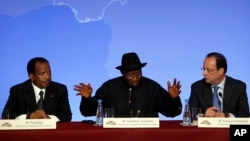YAOUNDE —
The presidents of Cameroon and Chad on Friday concluded two days of meetings during which they fine-tuned plans and reiterated commitments to a declaration of war on Nigeria-based Boko Haram militants made in Paris last week.
Addressing a crowd of applauding Chadians and Cameroonians, both presidents vowed cooperation in efforts to monitor and protect the region from violence perpetrated by the Islamist radicals.
"The public enemy Boko Haram has remained a permanent threat to peace and security," Cameroonian President Paul Biya said. "As far as I am concerned, we are to organize with Chad information sharing, joint patrols and information exchange and other surveillance mechanisms because it is a thing we cannot allow to continue."
Chadian President Idriss Deby called Boko Haram an evil force that must be eradicated.
"All Muslims in the world should listen to me: Kidnapping children is not Islam; killing innocent citizens is not Islam," Deby said. "Cameroon and Chad will work together to stop all evil forces. All Muslims should unite effort and fight these obscure people."
Both leaders asked the population to cooperate with their national security forces in reporting suspects.
Frederick Ayangma, a resident of North Cameroon province, where Boko Haram has been operating, told VOA it will be difficult to convince people to report suspects because of personal security fears.
"People are reticent because they do not have confidence in the security forces," he said. "If you have a neighbor and think that he can be part of criminal or terrorist group, you are not sure that when you give the information to the police, they will protect you. At times even when the name of the informant is not given, and the police go ahead to say that the information was given by a neighbor, the suspect starts attacking his neighbors saying that he has been betrayed by them."
According to Nyambelle Elvis, a Chadian expert on security issues, Biya and Deby on Thursday agreed to allow the other's security forces to cross borders in pursuit of terrorists and armed groups for up to 30 kilometers. Elvis also said the president's examined security reports that Boko Haram received sophisticated weapons from the Middle East and the Maghreb via routes through Sudan, Chad, and Cameroon.
He said weapons also came in from Libya and that training of Boko Haram members took place in Mali when Islamist militants controlled the north of that country.
The presidents met as the United States deployed 80 military personnel to Chad, where they will aid in the search for 276 Nigerian schoolgirls seized by Boko Haram.
Addressing a crowd of applauding Chadians and Cameroonians, both presidents vowed cooperation in efforts to monitor and protect the region from violence perpetrated by the Islamist radicals.
"The public enemy Boko Haram has remained a permanent threat to peace and security," Cameroonian President Paul Biya said. "As far as I am concerned, we are to organize with Chad information sharing, joint patrols and information exchange and other surveillance mechanisms because it is a thing we cannot allow to continue."
Chadian President Idriss Deby called Boko Haram an evil force that must be eradicated.
"All Muslims in the world should listen to me: Kidnapping children is not Islam; killing innocent citizens is not Islam," Deby said. "Cameroon and Chad will work together to stop all evil forces. All Muslims should unite effort and fight these obscure people."
Both leaders asked the population to cooperate with their national security forces in reporting suspects.
Frederick Ayangma, a resident of North Cameroon province, where Boko Haram has been operating, told VOA it will be difficult to convince people to report suspects because of personal security fears.
"People are reticent because they do not have confidence in the security forces," he said. "If you have a neighbor and think that he can be part of criminal or terrorist group, you are not sure that when you give the information to the police, they will protect you. At times even when the name of the informant is not given, and the police go ahead to say that the information was given by a neighbor, the suspect starts attacking his neighbors saying that he has been betrayed by them."
According to Nyambelle Elvis, a Chadian expert on security issues, Biya and Deby on Thursday agreed to allow the other's security forces to cross borders in pursuit of terrorists and armed groups for up to 30 kilometers. Elvis also said the president's examined security reports that Boko Haram received sophisticated weapons from the Middle East and the Maghreb via routes through Sudan, Chad, and Cameroon.
He said weapons also came in from Libya and that training of Boko Haram members took place in Mali when Islamist militants controlled the north of that country.
The presidents met as the United States deployed 80 military personnel to Chad, where they will aid in the search for 276 Nigerian schoolgirls seized by Boko Haram.




